Back in 1965 Rod was the most versatile of the three. He did vocals and wrote many of the songs he sang accompanying himself on the mandolin. And he was also proficient on guitar, dobro, violin, and viola. The group he led was called the Front Porch Back Steppers. I don't recall any others in that group but they probably included Charlie Taylor on bass and keyboard and maybe Don Gale on banjo.
This video was made 45 years after I met Rod but it gives some idea of the music I heard him play: Rod Moag at Forest Grove
Rod is much more than a versatile musician. He's a linguist with a specialty in languages of the Indian sub-continent. When I knew him he was studying for his Master's in Indian Studies at the University of Wisconsin. This photo shows him at a Peace Corps training program where he gave instruction in speaking Malayalam, the language of the Indian state of Kerala.
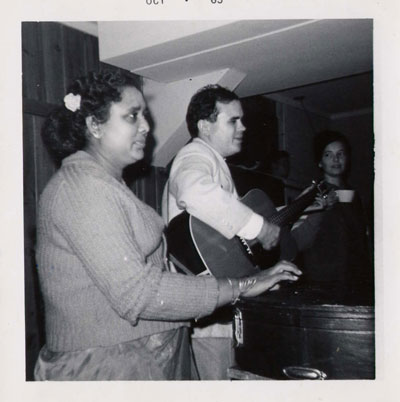
Rod's blindness seems more an attribute than a liability. It certainly hasn't been an obstacle in his careers as professor and musician. When I knew him in Madison he moved easily around campus and downtown, using his foldable "elephant thermometer" as much to warn people that he was sightless as to navigate his way. He told me he liked to run foot races and that he could "watch" tv, not just listen to the audio component. He'd pepper his conversation with visual idioms such as "see you later" and "I saw him (or her) the other day."
I'd often sit with Rod's wife, Rachel, at Glenn & Ann's, the bar where the backsteppers played. She told me about Rod's ability to cook, clean, and manage his life so independently that there seemed little difference between him and her sighted friends. She did say, however, that she was taken back the first time she visited his apartment during the evening. When she saw all the lights were out, she thought maybe Rod had forgotten their date and almost left without knocking. But he'd heard her approach and called out a welcome. After that, he said he tried to remember to put a light on when he thought it might be dark outside.
I remember driving Rod and Rachel to Minneapolis one weekend. She was many months pregnant and the two of them thought it best that she not drive that long way. They owned a VW Beetle which fitted us well enough but without a whole lot of room to spare. I can't recall the purpose of the trip. Possibly to attend an event at the Guthrie Theater, possibly to visit her parents, probably both.
An internet search turns up this clipping announcing Rod and Rachel's engagement.
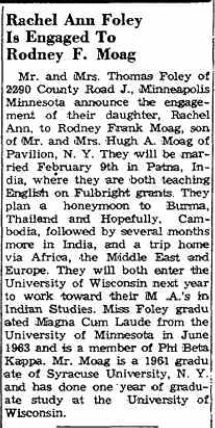
If Rod is the most versatile of my three musicians of 1965, Tracy Nelson is the best singer. When young, both she and Rod used radio programs as their source of inspiration. In his case it was country and bluegrass music coming out of Nashville and vicinity. In hers it was blues coming from the clubs of Chicago's South Side. Both of them nurtured their talents somewhat against the grain — he as a kid from upstate New York with a bent for the music of Appalachia and she as a kid from central Wisconsin with a talent for singing Black urban blues. She was an undergraduate in the School of Social Work at the University of Wisconsin when he was there studying for his Master's in Indian Studies.
They share a love for music that has deep roots in regional traditions, a kind of historical authenticity. For Rod this manifests as a love for old time country/bluegrass and Texas swing. Tracy's passion is two-fold: first for the music which grew from African-American field hollars and guitar blues and expressed itself in urban ghettos of burgeoning industrial cities, and second for the same Appalachian sound which Rod admires. In an interview Tracy once revealed how unsuited she felt herself to be in the Hait-Ashbury atmosphere of the early 1970s. She felt uncomfortable with the culture of drugs, hip spiritualism, and pounding rock rhythms and at that time she moved from San Francisco to Nashville, left her blues rock band and made a country album.
This is how she looked at the time I met her.
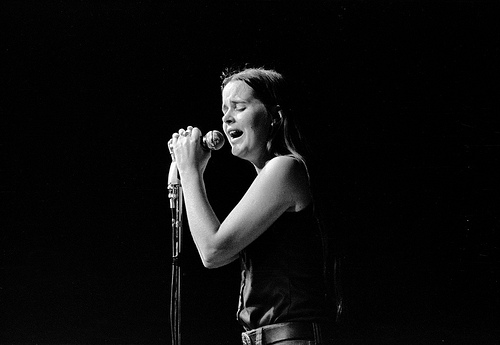
In 1964 she was able to make her first album courtesy of Sam Charters who arranged a recording session with Prestige. I came to know her at about that time. My flatmate had met her — I forget how — and after they'd started seeing one another she'd drop by and sometimes to sing but mostly just to share some beers and talk. My flatmate played stride piano, picked up from listening to radio broadcasts from his childhood home in Kansas. When Tracy put together the group that was to back her at the Prestige recording date she included him as pianist.
The recording is Deep Are the Roots. Released in 1965, it contained songs from the blues greats of the 1920s and '30s, including Bessie Smith and Ma Rainey.
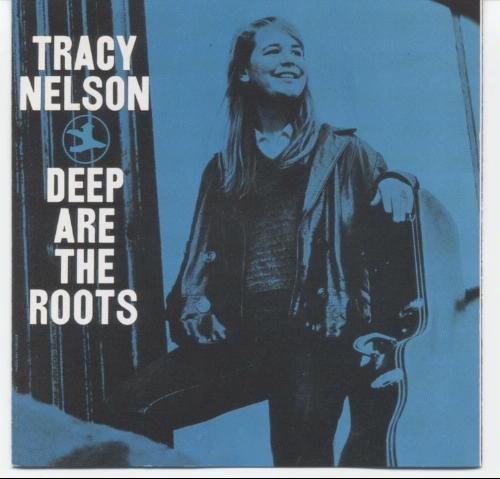
You can hear four 30-second teasers from that record in a sampler put out by Prestige called The Bluesville Years, Vol. 7: Blues Blue, Blues White. The teasers show that Tracy's voice was powerful then but not as strong as it would become later in her professional career. They display the harmonica playing of her friend Charlie Musselwhite and the piano of my flatmate.
Tracy sang at a place called The Pub in Madison, but I don't recall going there to see her perform.
There are quite a few videos of Tracy on YouTube. One features a song she wrote in 1968. It's from The Lonesome Pine Specials of 1987 (The Kentucky Center for the Performing Arts): Tracy Nelson - Down So Low. Another comes from the 22nd Annual Simi Valley Cajun & Blues Music Festival on Memorial Day Weekend, 2011: One More Mile (Muddy Waters) - Mannish Boys Revue with Tracy Nelson - Live in Simi Valley.
She sings both blues and country in snippets played during this interview on the American Routes program (radio station WWNO, Aug. 4, 2010). This interview, which includes an excellent and succinct overview of Tracy's career, brings out a side of her music I hadn't known about. After blues and country, she turned to R&B for a while. Some of the songs she sang at this time were covers of ones by Irma Thomas and Tracy worked with Irma at least once. You can hear her with Marcia Ball doing backup vocals on this video:
Tracy showed a more popular country style in a segment of the Prairie Home Companion show of June 16, 2001: Got A New Truck - Tracy Nelson and Band, Live from the Orpheum Theater in Memphis. Before the show Tracy participated in an interview that's available here: Tracy Nelson: Living Well, June 12, 2001, by Russ Ringsak.
This image shows Tracy's first country album (and the one that turned up in our attic).
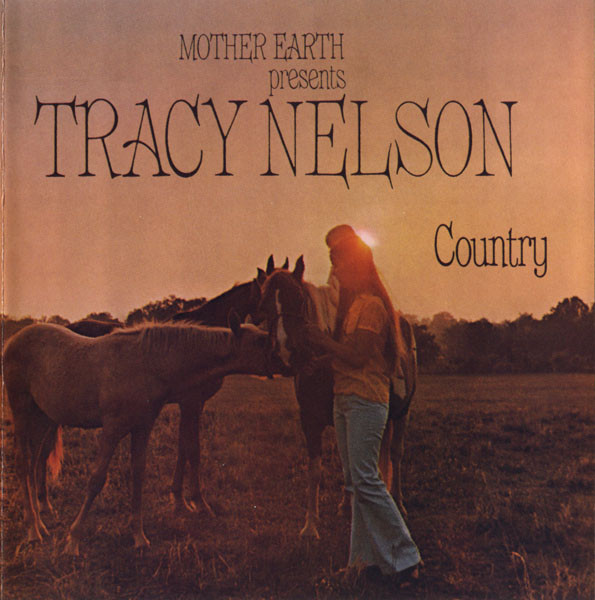
A few days ago, on the occasion of Tracy's birthday, a favorite blogger of mine — Bent Sorensen — linked to two of her songs, one from the earliest country album and the other from her San Francisco band, Mother Earth: (1) Tracy Nelson: I Fall To Pieces - from Mother Earth Presents Tracy Nelson Country, 1969 and (2) Mother Earth: Mother Earth (Memphis Slim) - from Living With the Animals, 1968. Of the former Bent says Tracy's version is better than Patsy Cline’s original and of the latter he says Tracy is "one of the most underrated female singers of all time." He also points out that the latter feature "Makel Blumfeld" on lead guitar, that man being the great Mike Bloomfield. It also features Barry Goldberg on keyboards.
If Rod Moag and Tracy Nelson have much in common, neither, so far as I know, has any connection with Bill Evans. His place in this blog post is really about the act of another 1965 U of W friend, Elspeth Leacock, who (as I say) put Everybody Digs Bill Evans in my hands. She gave it to me after I'd admitted that I enjoyed Miles Davis's Kind of Blue and Sketches of Spain, but did not really have much else in the way of jazz likes. Or much knowledge. I certainly didn't know that Bill Evans played on the former and didn't notice there was no piano on the latter. I've always been grateful to Elspeth for introducing me to his music. I've collected his recordings ever since and they've given me pleasure for close on fifty years.
I can't recall how I came to know Elspeth but suspect we met via mutual friends Carole Deutch and Phil Buss. Phil was another Madison musician. He played and sang at the 609 Club and Nitty Gritty and he had a shop where he made high quality guitars. I recall a time when he took me out for some target practice using rifles and a pistol that he owned. Carole was a friend of his. In the late '60s she married a fellow history grad student who would later become Chairman of the Board at John Wiley & Sons.
This shows Carole in the Bernal Heights district of San Francisco in the early 1970s.
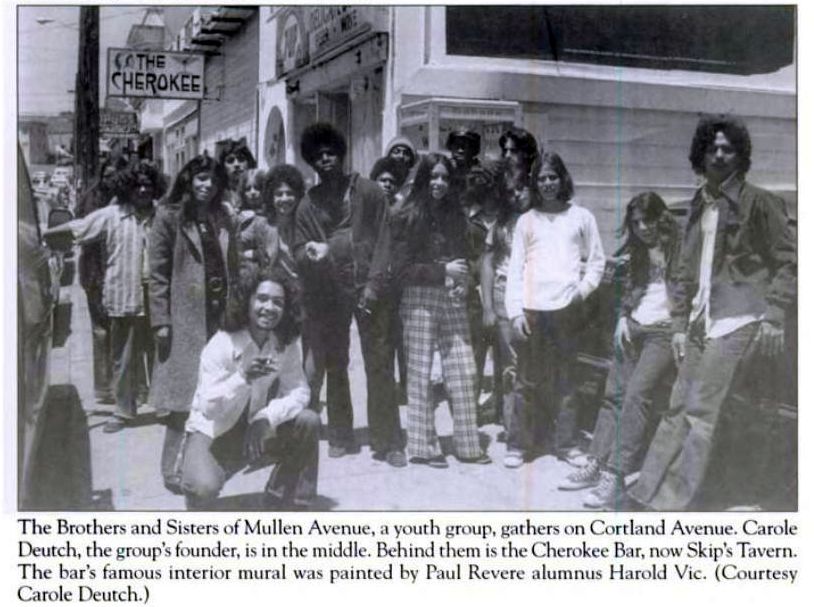
Here is a guitar Phil made for his younger sister.
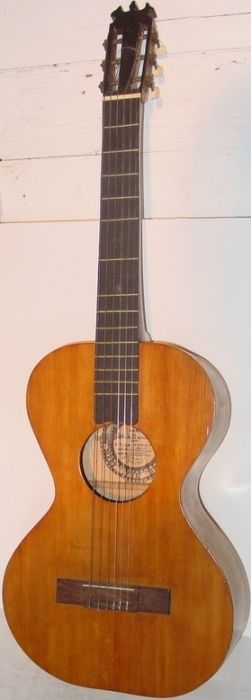
Someone with the handle hansgy1 has put Everybody Digs Bill Evans on YouTube. I'd link to it, but I'm not sure hansgy1 obtained rights before uploading.
------------
Side notes:
1. Searching Phil brings up reminiscences from friends of his. One mentions some of the musicians who also played the Madison clubs in the mid-1960s, including Marshall Brickman, Danny Kalb, Eric Weissberg, and Paul Prestopino. I think they are all still performing; Phil died young: 15 June 1988, at the age of 49.
Here's the text of one reminiscence of Phil:
Nitty Gritty bar: Re: Marsh Shapiro, RIP
Post by snoqueen » Wed Dec 26, 2012 3:59 pm
His original Nitty Gritty was the greatest place downtown. I can picture sitting in there on a Sunday night in about 1974 listening to Phil Buss play "In The Pines" with pinball games jingling in the background. One time Phil had a bunch of friends sitting in and they jammed on Folsom Prison. It was one of those performances that lifted the roof off the building and I still get chills remembering how it just would not stop. You could tell when Marsh was happy -- he'd jump up on one of the picnic tables. He did on that night.
The Gritty hosted an amazing lineup of bands. I think the State Historical Society has a definitive collection of street posters from the era -- the beginning of "postering" -- and if someone was interested they could assemble a nice little Gritty retrospective in Marsh's memory.
Thanks to Marsh Shapiro for a fine little bar and some good times -- and that's a nice legacy.
2. The web page that contains the photo of Rod doing Peace Corps language training also includes a photo of trainees drinking beer, Blatz beer. In 1965 a 6-pack of that beer cost maybe $0.99 at the local supermarket (and if you saved your Green Stamps you might get it for less). Though that seems cheap, I didn't always have the cash to buy it. A pocket calendar I kept then contains the statement "flat broke" in the box for September 15, 1965. (In fact 99 cents was probably a fair price for that beer in current terms; using the CPI inflator shows that a 1965 dollar is now worth more than $7.00.)




2 comments:
It was the 602 Club, a beer bar on lower State Street just before the Library Mall. I lived in Madison from 61 to 69 and Knew Phil right from the get go because I was a folkie and also drank with my friends at the 602 because the pitchers of beer (probably Hamms) were really cheap and we could get loaded for very little. One of my drinking buddies was Phil bus and I knew him that entire time I lived in Madison. He was a great guy and great great musician.
My name btw is Rozee and my memory of those years is still damn good considering that it was 64 years ago.
Post a Comment